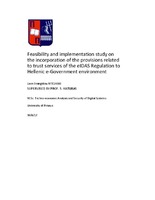Feasibility and implementation study on the incorporation of the provisions related to trust services of the eIDAS Regulation to Hellenic e-government environment

Master Thesis
Συγγραφέας
Ευαγγελίου, Λέων
Evangeliou, Leon
Ημερομηνία
2017-06Επιβλέπων
Κάτσικας, ΣωκράτηςΠροβολή/
Λέξεις κλειδιά
eID ; eIDAS ; Digital market ; GreeceΠερίληψη
Over the years, the EU market has been facing security and privacy challenges in relation to electronic transactions and electronic signatures as users conduct their business processes online. In fact, data/information security breaches remain a major threat to successful electronic funds transfer (EFT) transactions among mobile and Web-based processes to-date. In addition, inadequate compatibility, accessibility, and transparency of standards for electronic identification, authentication and trusted services have been identified as factors inhibiting digital growth and innovation in the EU. For example, it is difficult for a member state to recognise an electronic identification system based on a framework different from what it uses . Therefore, security and privacy, compatibility, accessibility, and transparency issues are key inhibitor to sustained digital development and innovation in the EU.
With growing concerns of digital growth, innovation, and information security, electronic IDentification, Authentication and trust Services (eIDAS) was established by the European Commission as a regulation to promote the European digital agenda. This regulation covers aspects of electronic identification, trust services, and electronic documents used by EU member states to ensure secure cross-border business. It provides member states with trusted services (especially electronic signatures, time stamps, and seals, electronic registered delivery services, and certificates for website authentication), which may be readily assessed within the integrated EU signing framework. Consequently, security stakeholders are better placed to make more informed decisions when securing electronic signatures. Therefore, all member states must recognise and use electronic identification and authentication mechanisms as well as trust services that comply with eIDAS standards as required by EU regulations for digital growth and prosperous Europe. This is a feasibility and implementation study on the incorporation of the provisions related to trust services of the eIDAS Regulation to Hellenic e-Government environment.


